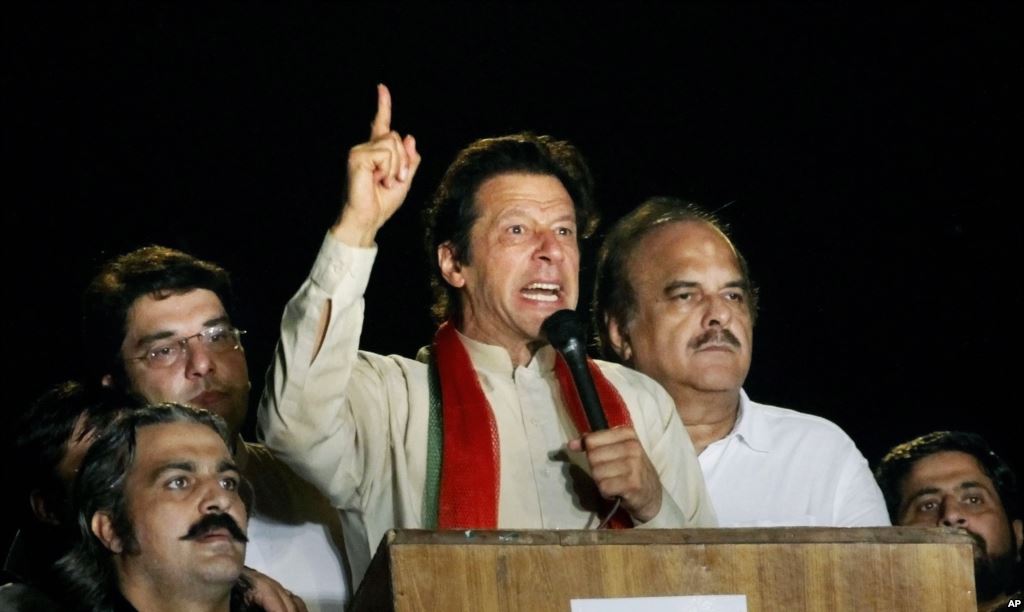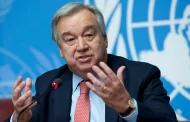e-News® | The NEWS Company…: KARACHI – The nerve-wracking sit-ins of thousands of protesters of the Imran Khan-led Pakistan Tehreek-e-Insaf (PTI) and Dr Tahirul Qadri’s Pakistan Awami Tehreek (PAT), now in the 11th day, have turned Islamabad’s D-Chowk, the highly sensitive area in front of the Parliament House and near diplomatic enclave, into a version of Cairo’s Tahrir Square. Qadri, a Canadian cleric has besieged the country’s capital with thousands of protesters in the capital’s Red zone area, while it is thousands of Imran Khan’s supporters who have flocked to D-Chowk to demonstrate anger at alleged vote-rigging in last year’s election.
Whichever camp they back, protesters are demanding removal of the government of Nawaz Sharif, the dissolution of parliament and a re-election. Qadri’s 48-hour deadline to the ruling Pakistan Muslim League-Nawaz (PML-N) government expires on Wednesday and the cleric asked members of National Assembly to leave the house before the deadline is reached.
In 2011, thousands of people gathered at Tahrir Square in Egypt to end the authoritarian rule of Hosni Mubarek, and after a period with an elected Muslim Brotherhood in power ended up living with military in full command. Unlike Egypt in 2011, Pakistan has an elected parliament, an elected government and an independent and powerful judiciary. Khan has labelled Sharif as “the Hosni Mubarek of Pakistan”, criticizing him for adopting an authoritarian style much like Arab monarchs, instead of being a democrat. Undoubtedly, in its political history of more than 65 years Pakistan has witnessed either military dictatorships or electoral despotism, but never true democracy. It is a hard fact that military-led coups were ever welcomed by the people and even the people danced in the streets at the dismissal of political governments in the past.
A number of financial scams and scandals involving billions of rupees in corruption by authorities have come to surface in the past five years. The country has consistently performed poorly on the Corruption Perception Index (CPI) of Transparency International, and is among the countries with the most perceived corruption each year. Transparency International viewed corruption as being equally pervasive within federal and provincial governments. People have to offer bribes in their dealings with government institutions to access basic public services. Bad governance has eroded efficiency in public sector enterprises, which have become a perpetual drain on the national budget.
Like the previous elected government, the present government also entered into a loan program with the International Monetary Fund (IMF). The IMF beggar-thy-neighbor policies continued to deepen public frustration with an unpopular government and gradually led the economy to a stage where it is virtually living on cash injections from international lenders and donors. The frustration with the worsening socio-economic and unemployment situation is creating a breeding ground for social unrest and militancy. Desperation is growing due to rising poverty. The gap between rich and poor is widening and some poor parents have even decided to put their children on sale, while many have committed suicide.
Pakistan is ripe for a similar set of events that convulsed Egypt in 2011, as corruption, bad governance, surging poverty and soaring commodity prices have fueled spontaneous outbursts of anger against the ruling elite. Like Egypt, severe poverty with rising inflation is fomenting unrest. The political backlash has been imploding against the ruling elite, who are not ready to give up their luxuries and VIP status in a country where up to 40% of its 180 million populations live below poverty line.
Like Egypt, Pakistan also has a frustrated middle class and an army of qualified but unemployed youths pessimistic about their future, and looking to Imran Khan for hope of creating a “new Pakistan”. Khan’s PTI emerged as the second-largest vote catcher all over the country in last year’s elections. PTI is not ready to accept the Sharif mandate through what they see as rigged elections. PTI supporters have staged sit-ins in all the major cities demanding the removal of Sharif and a re-election in the country.
On the other hand, Qadri does not want mid-term elections, but the formation of a national government tasked to carry out ruthless accountability of the ruling elite and electoral reforms before new polls are held. Qadri had boycotted the last year’s elections after they took place without the implementation of the electoral reforms he had suggested. Last year, Qadri besieged Islamabad with thousands of protesters for four days, piling pressure on the government led by former President Asif Ali Zardari.
The developing situation may end up in a military coup if violence breaks out as a result of clashes between the protesters and police in the capital. Pakistan army has so far been the silent spectator and it has urged the both sides to resolve the conflict politically without use of force. However, that has yet to happen through dialogue. There is deadlock. Deterioration of law and order in the capital will only pave the way for another military coup and another derailment of democracy.
Critics say that Qadri has come out as the establishment’s proxy to derail the democratic process as the tussle between the military and the Sharif government flares up. It is not only in the indictment of former military ruler Pervez Musharraf for alleged high treason that the military does not seem on board with the government, but there are many policy areas where this is also the case. Pakistan’s history is full of tussles between the civilian government and powerful military, where the military has been the victor. The military has ruled for more than half the country’s history. Sharif lost previous governments twice during 1990s because of civil-military tensions. It could happen one more time.
Syed Fazl-e-Haider (www.syedfazlehaider.com ) is a development analyst in Pakistan. He is the author of many books, including The Economic Development of Balochistan (2004). E-mail, [email protected]. (Copyright 2014 Syed Fazl-e-Haider)





































